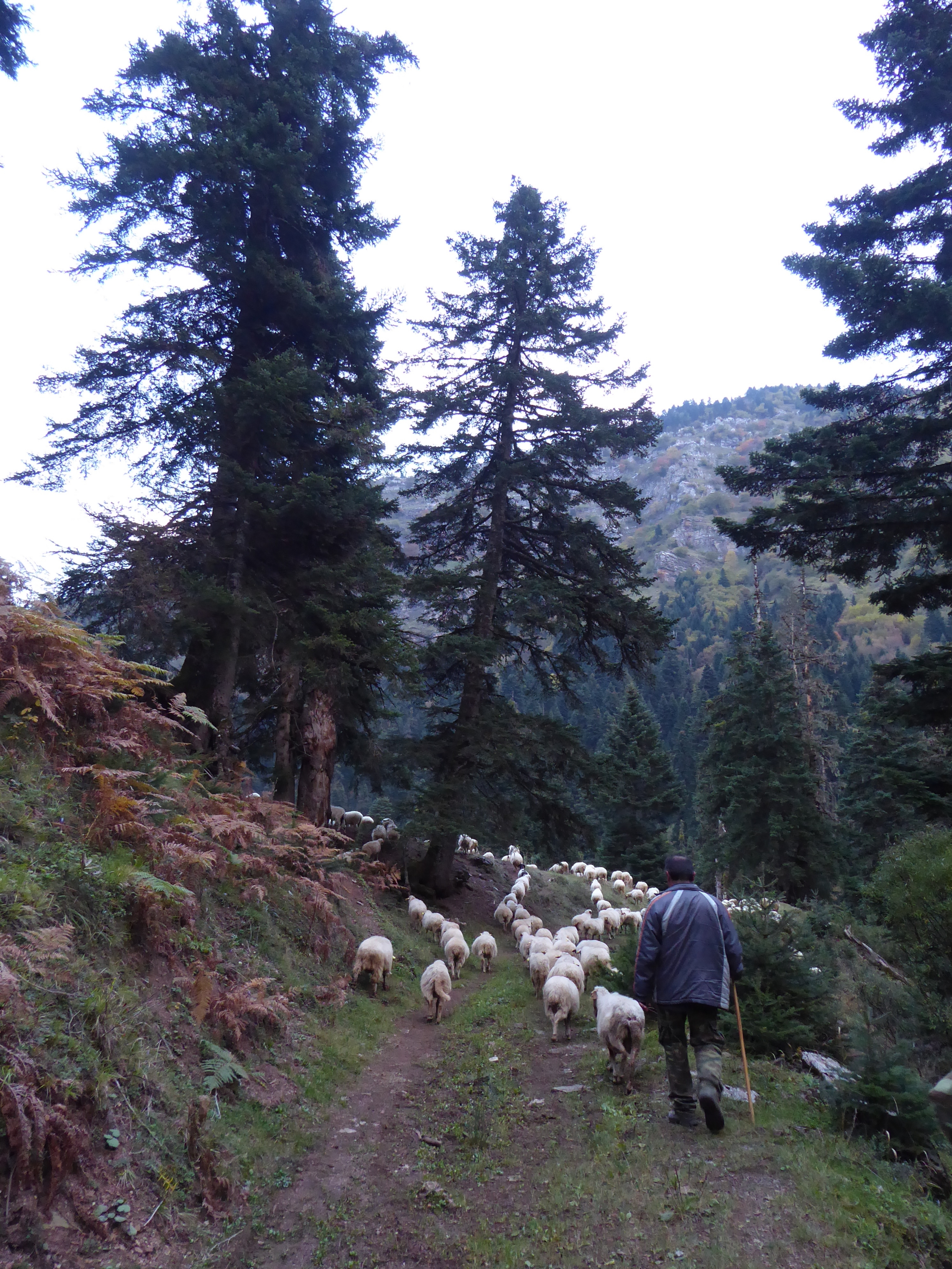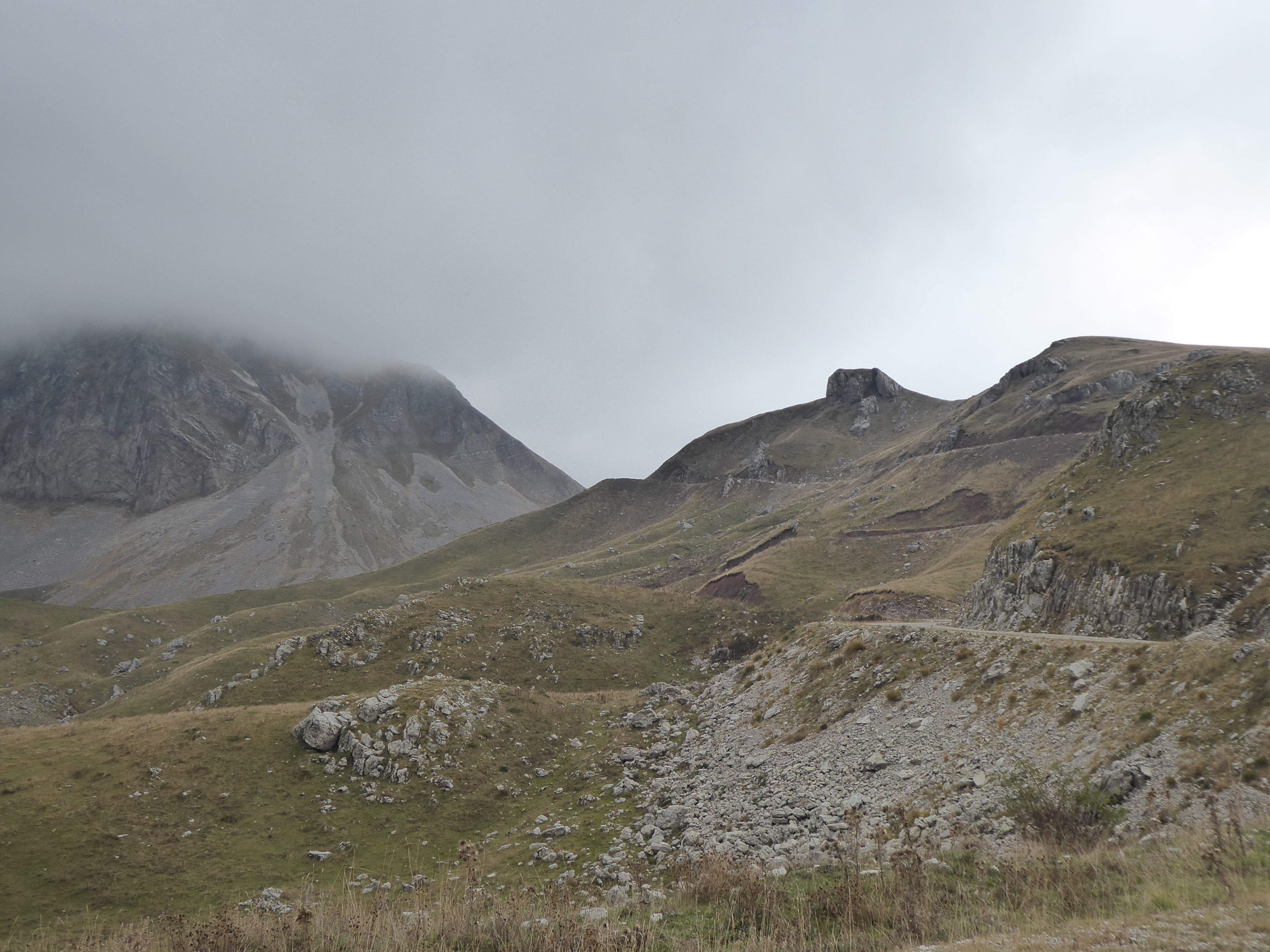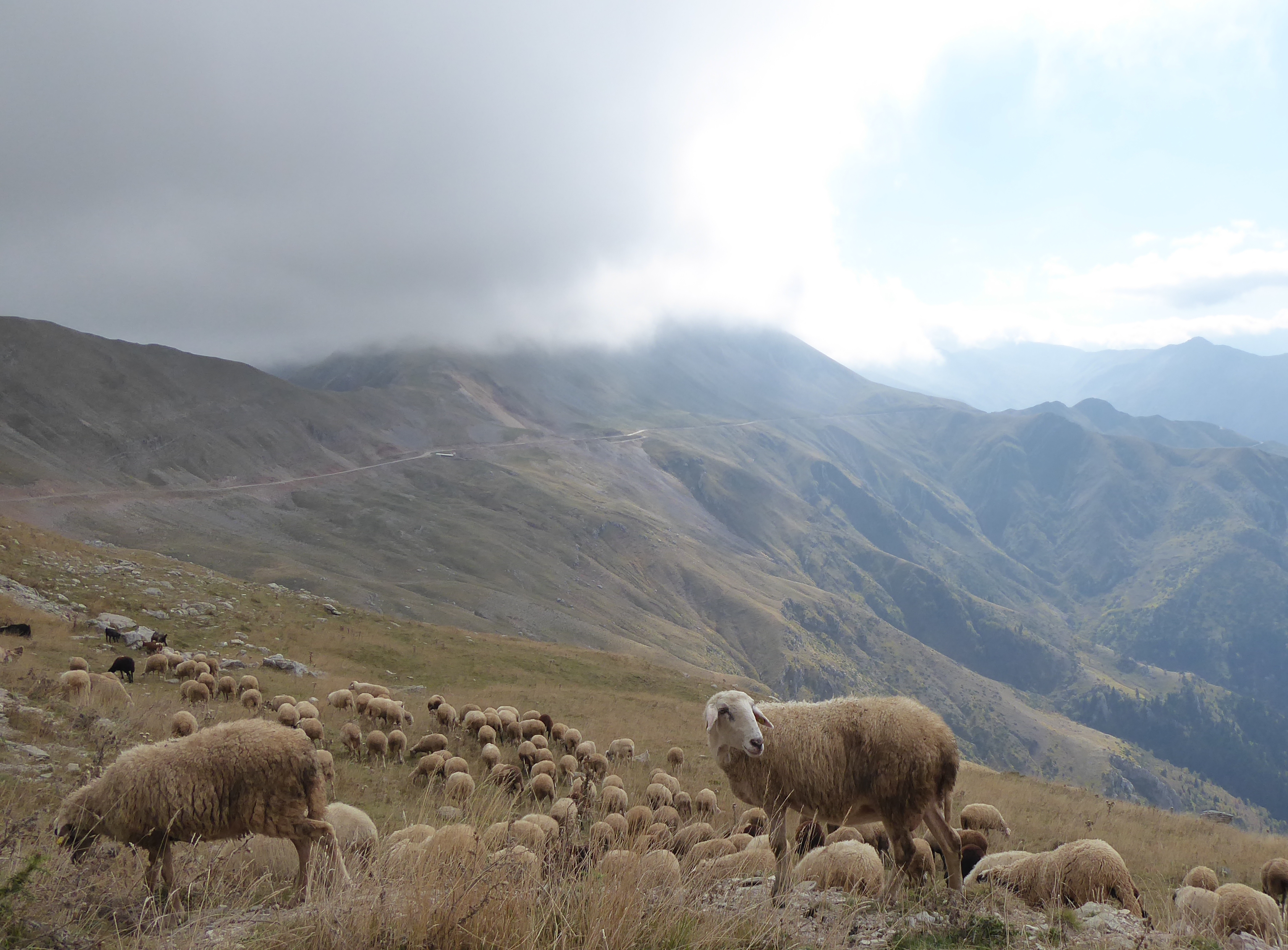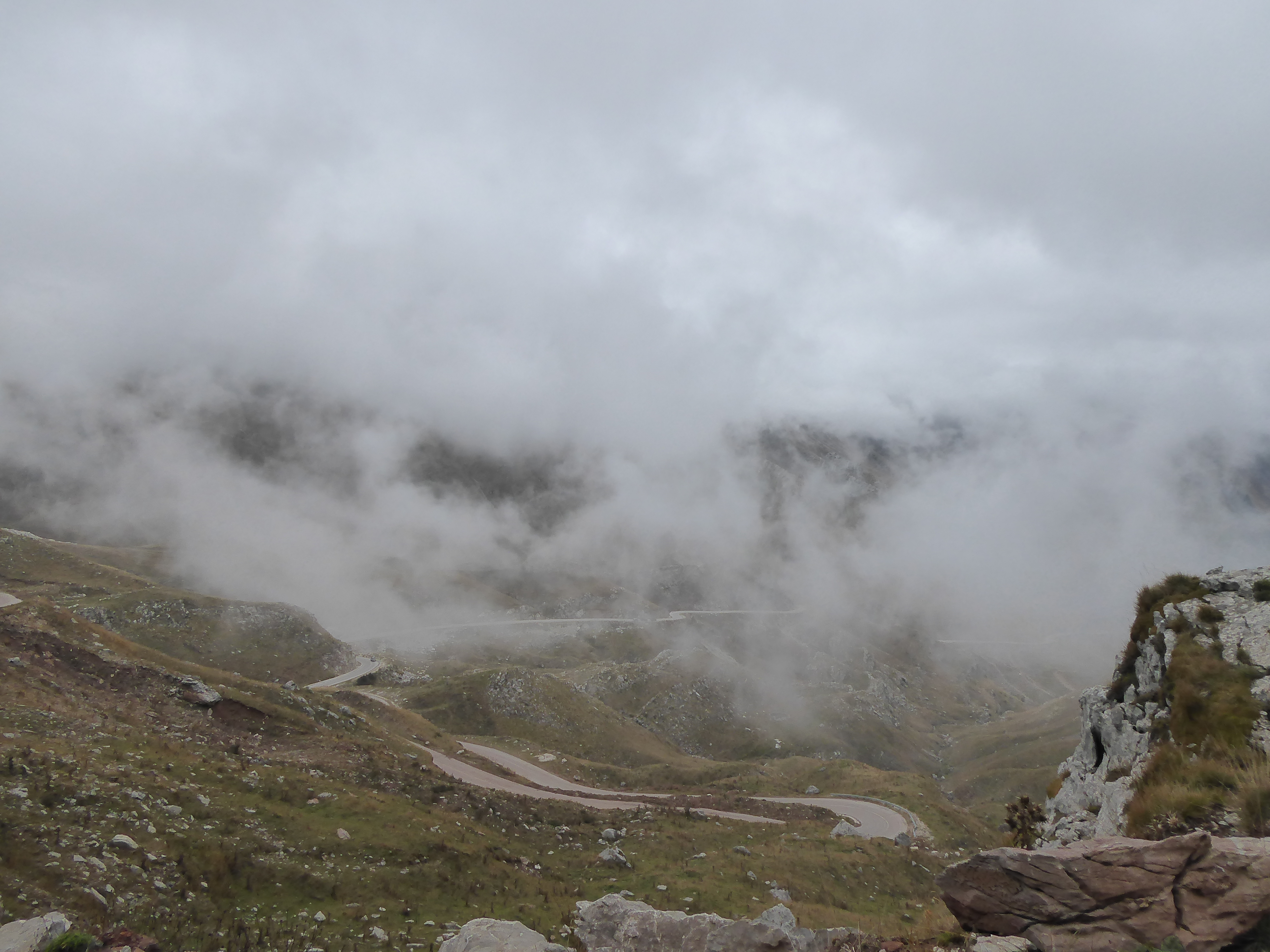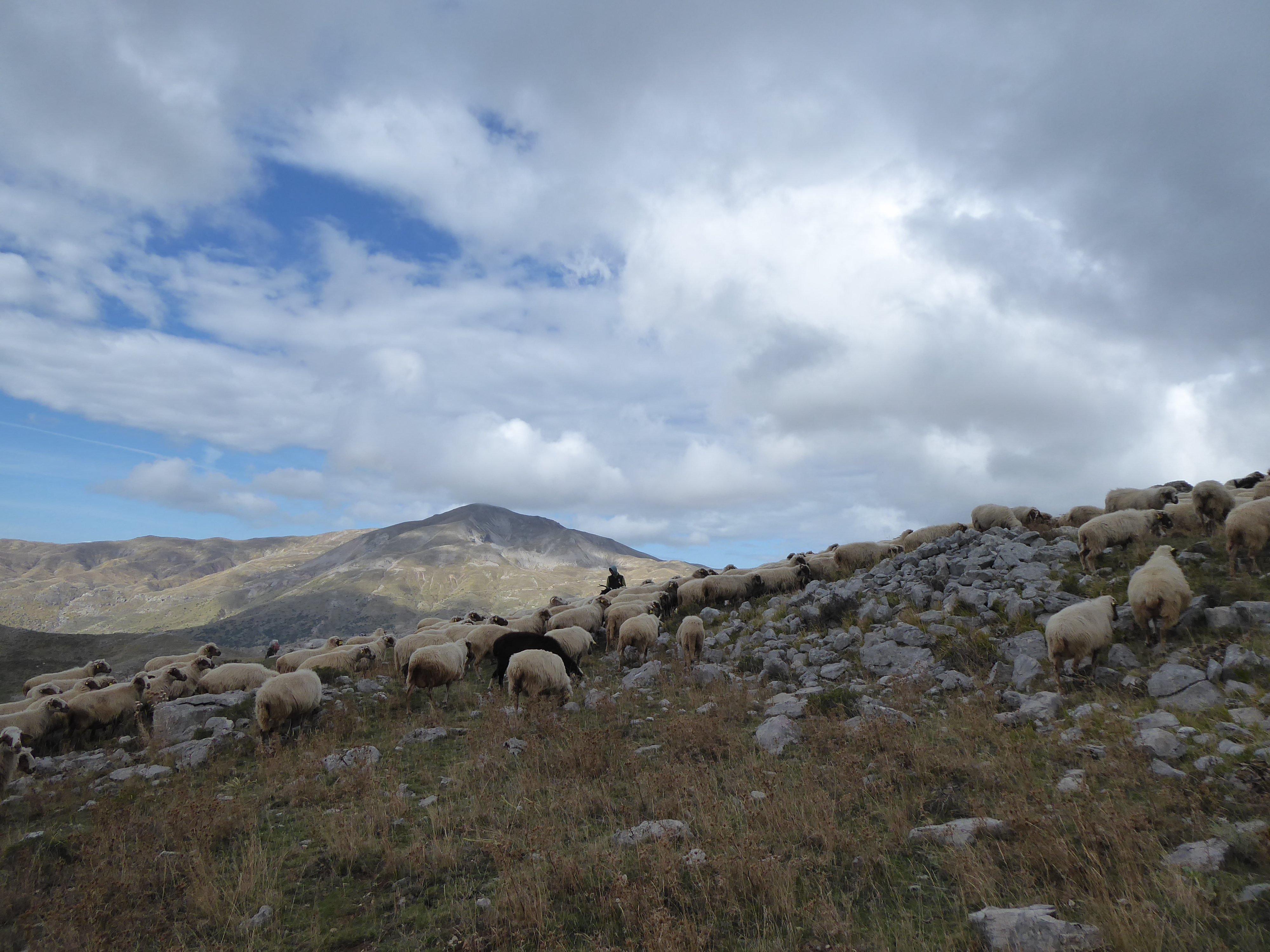Large towns were left behind as I made my way from Meteora to the Tzoumerka mountains. I arrived on quiet country roads which began passing through fewer and fewer villages. In what seemed like the middle of nowhere a farmer was selling apples. I stopped to buy some. The vehicles I did see were either logging trucks loaded with fresh-cut lumber or pick-up trucks driven by locals who zipped past me.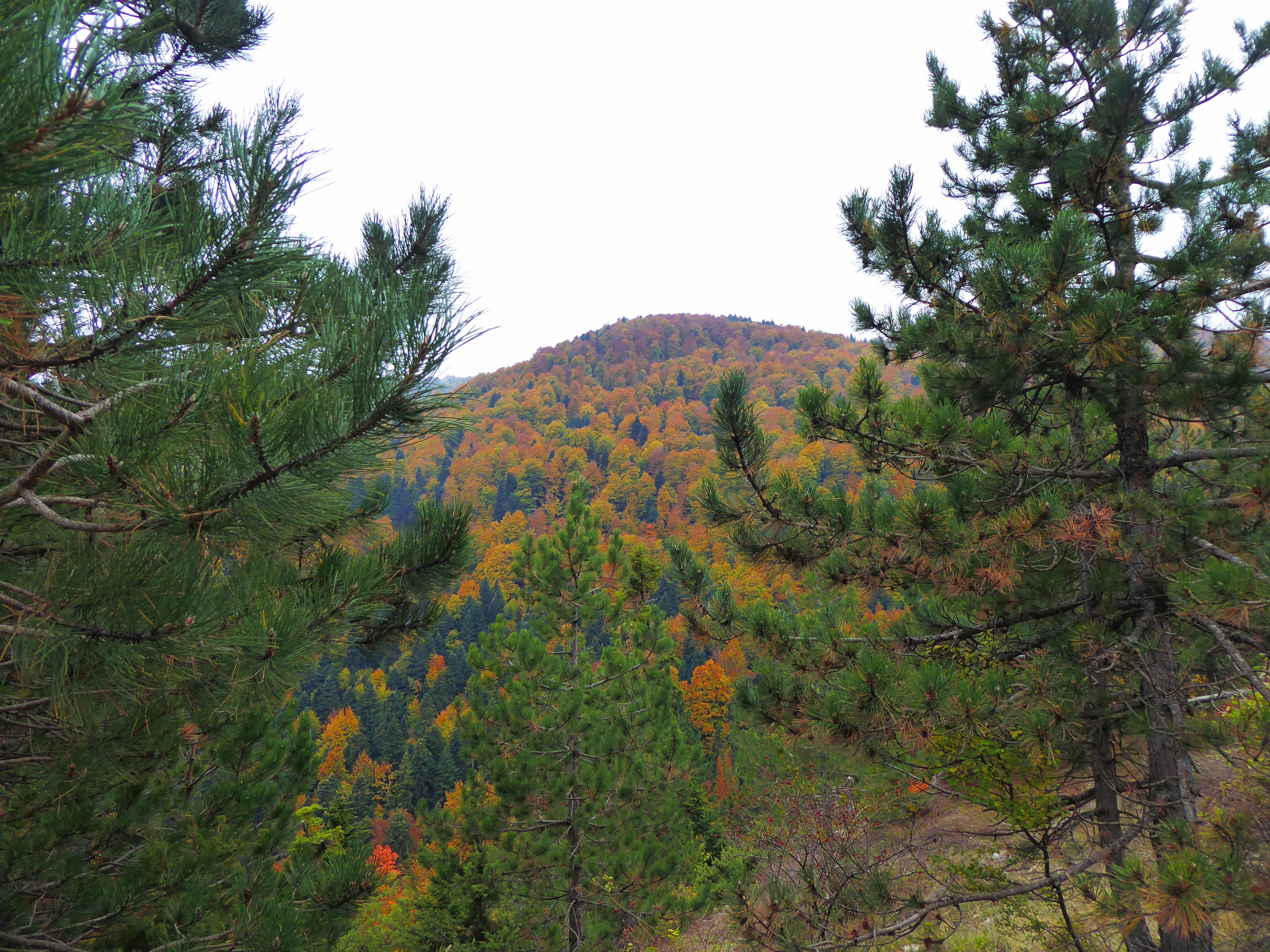
An abundance of fir and autumn-colored trees covered the hills. As the road ascended, the view opened up, and the bare mountains appeared. I was leaving the lush forests and waterfalls far behind.
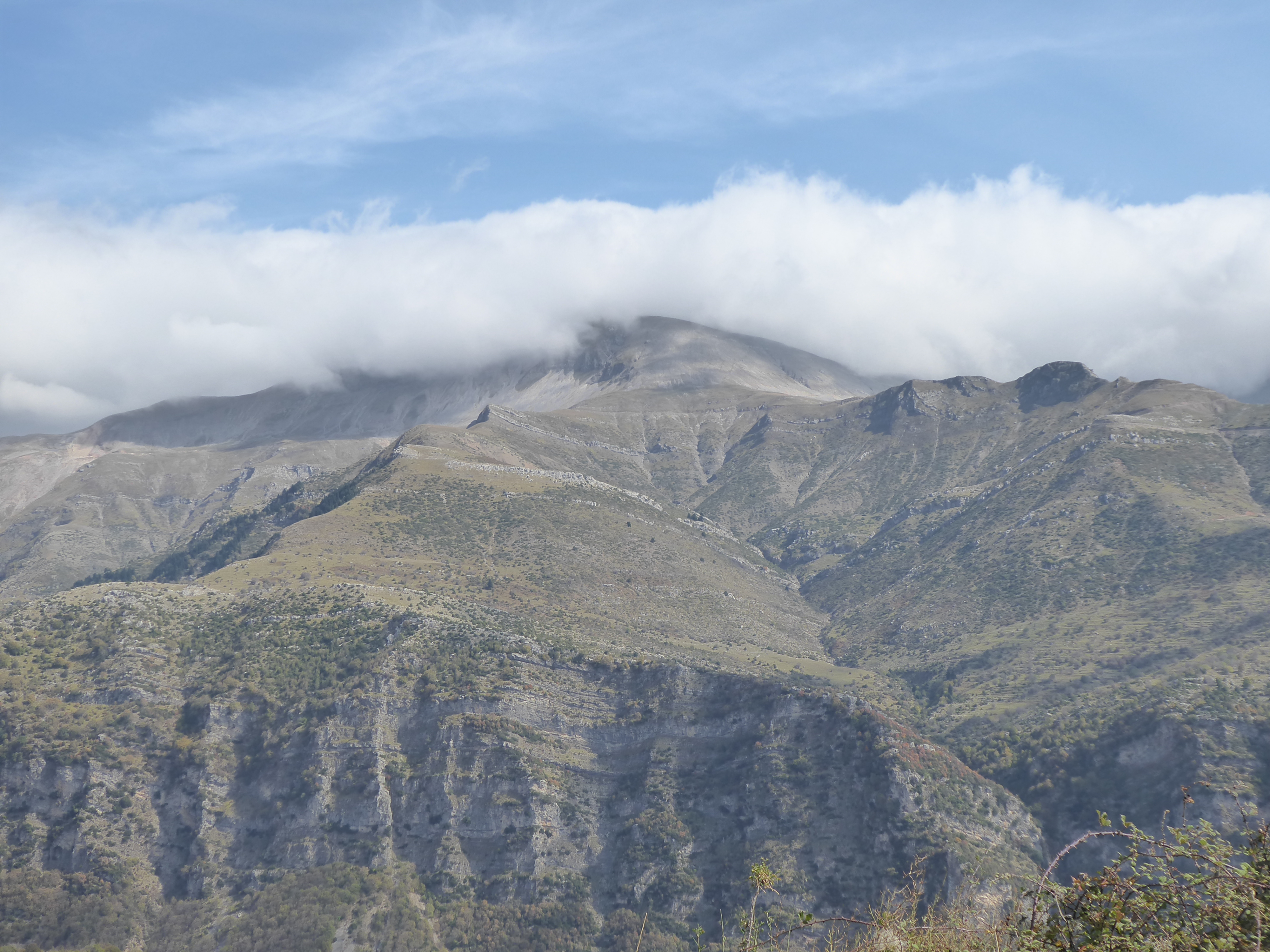
I wasn’t particularly concerned with the increasingly narrow, winding road–my time in Italy and Spain gave me considerable practice with these–as long as there was a road. Heavy rains had taken their toll: large chunks of asphalt had simply fallen away. And there was rarely any indication where this occurred. My speed, already slow, decreased. Fortunately I had the road mostly to myself.
Except for the sheep.
A flock of sheep were making their way down onto the road. I pulled over to admire them and the view. A shepherd with his, I assumed wife, were coaxing their flock to a pasture below. Both were bundled up. The air was much cooler from what I’d left behind. The man set down for a smoke while his wife walked on. Our communication was limited but, I understood enough to know he was asking me where I came from and to say “I’m from New York” in Greek. “Amerika” he said. He looked surprised, smiled, and went back to smoking.
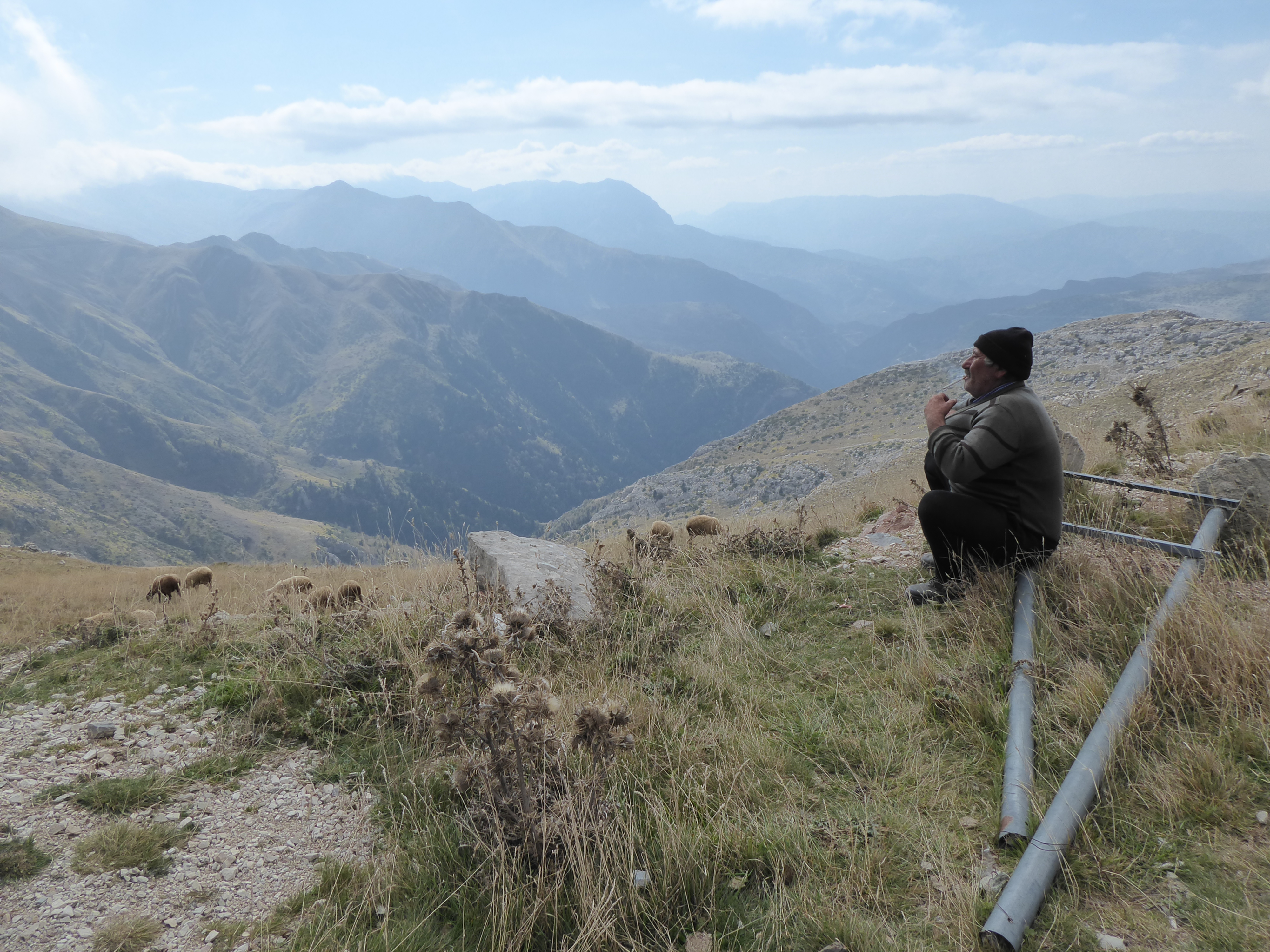
Signs were infrequent, and in Greek. Although I knew enough of the alphabet to get by, I relied heavily on my co-pilot, the Google Maps GPS lady, who I call Louise–since we’ve been spending so much time together I thought it only appropriate.
After much vigilance on the road, I arrived in the hamlet of Kalyrites. Or more specifically a parking area. The only access to the hamlet’s center was by foot on stone-paved paths. Kalyrites, with many different transliterations from the Greek, has been noted for its beauty and hiking opportunities. I planned to spend at least one night there.
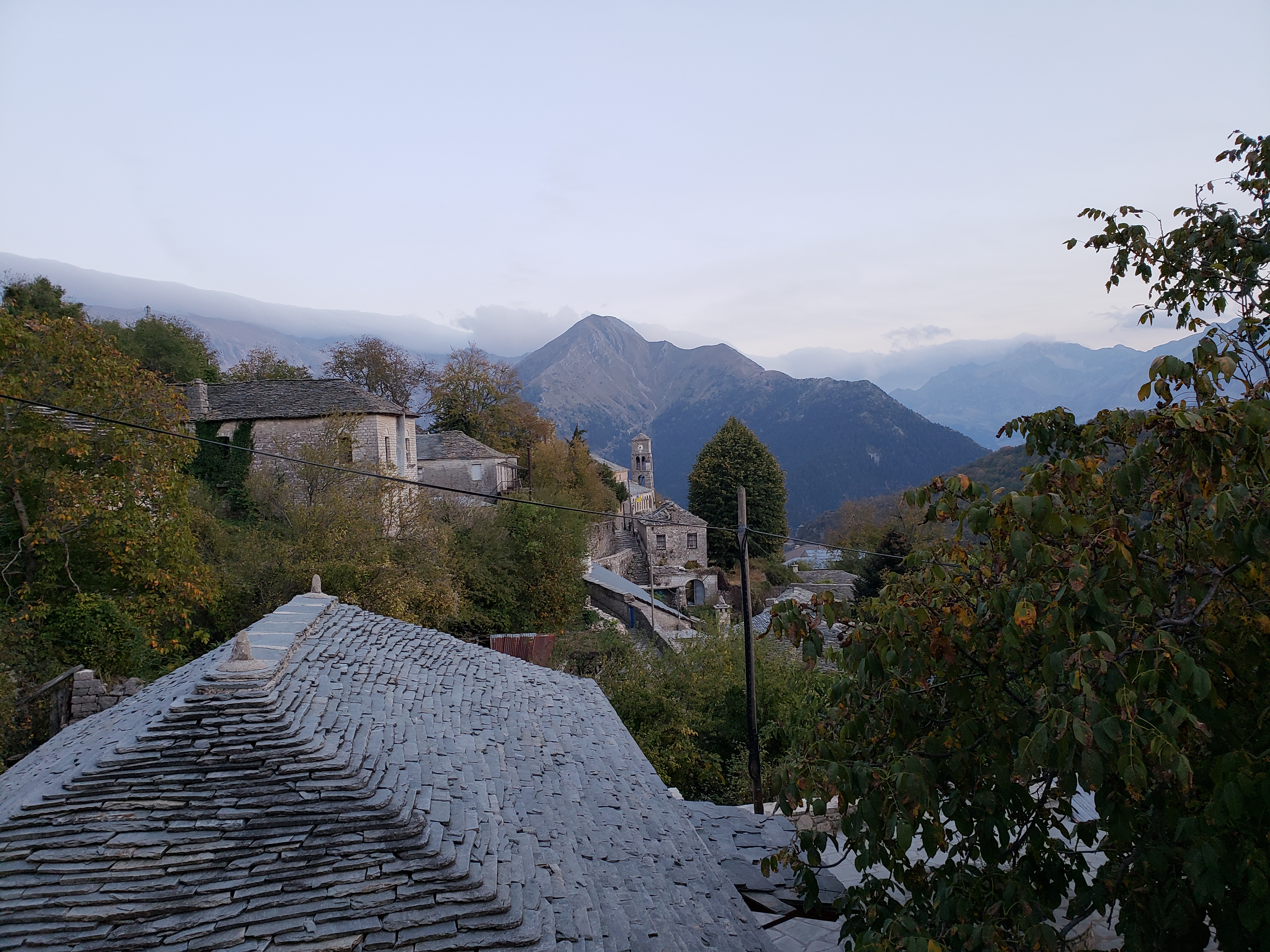
I’d read fine reviews of a Napoleon’s Guesthouse and hoped to find it and availability. I wandered past old houses also made of stone and little else. It didn’t take long to find the guesthouse–again thanks to Louise, but there was no one there despite the doors being wide open.
I walked a bit further and saw people sitting around a long, outdoor table. It was Napoleon’s fifth generation shop/restaurant/gathering place/heart and soul of Kalyrites. A dark-haired young man from the table immediately got up and invited me to join them. He and his beautiful, lithe, blonde wife had just gotten married there the day before. Napoleon’s shop was also a wedding hall.
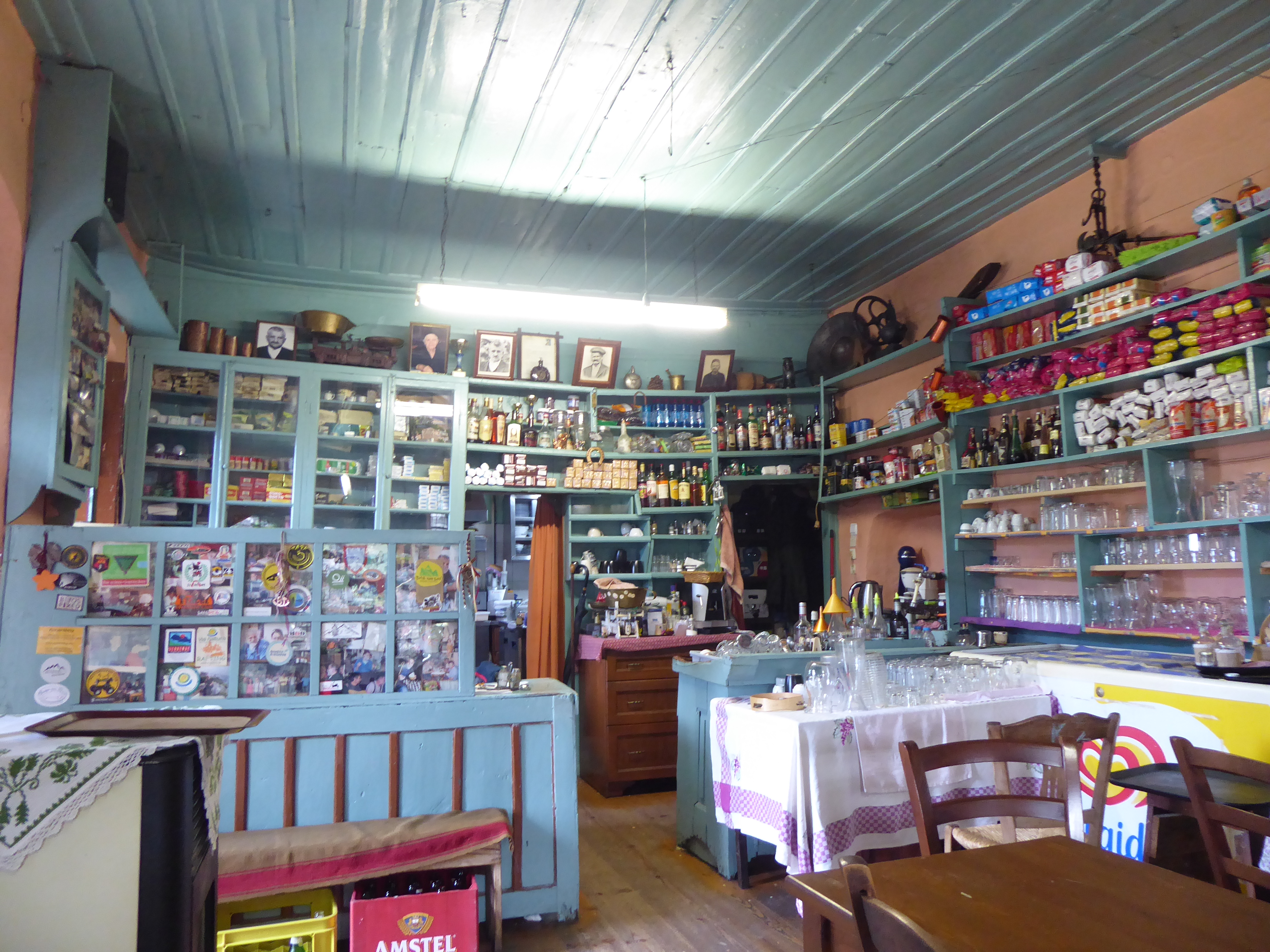
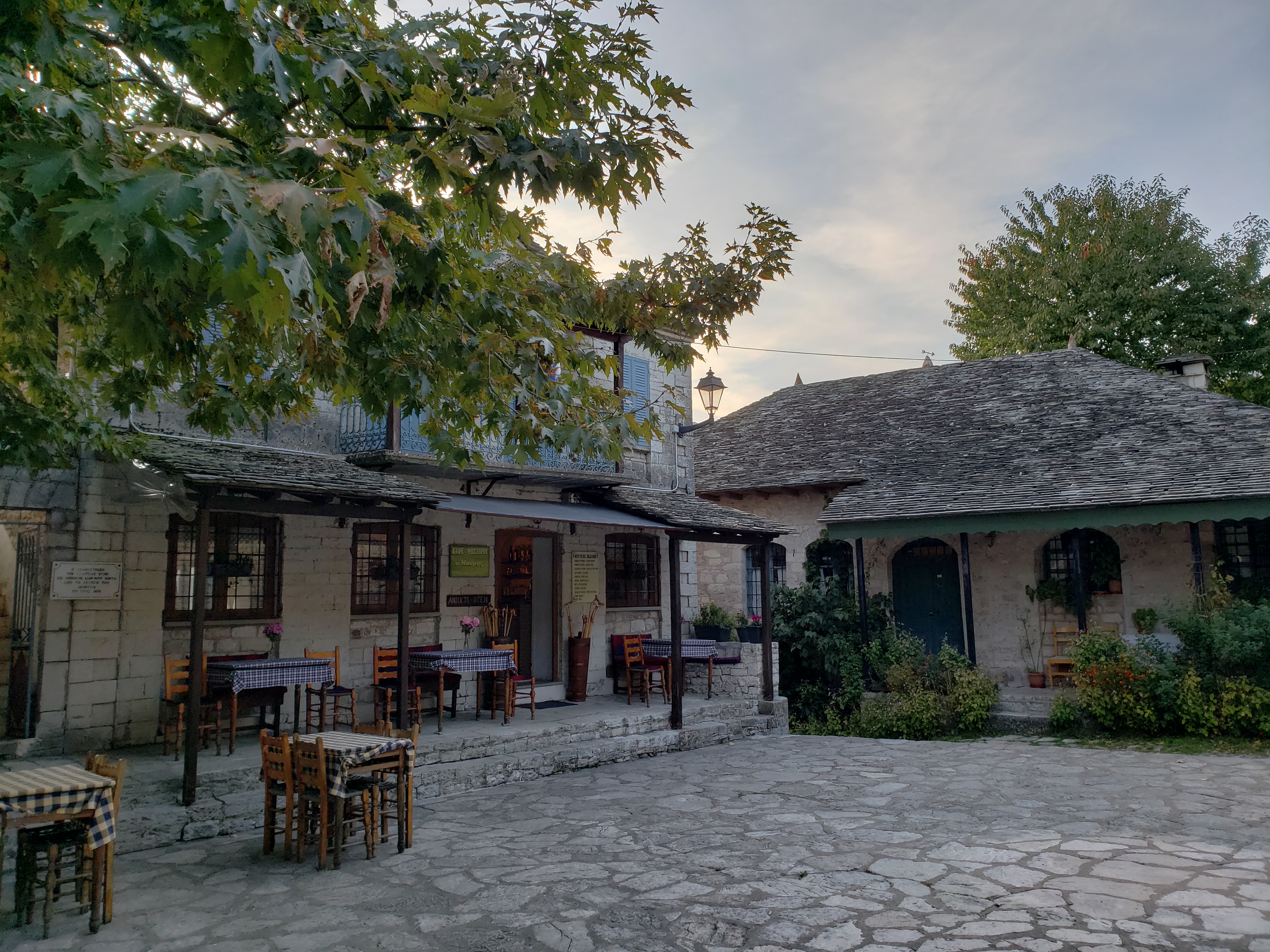
They spoke English fluently. It was the first marriage held in Kalyrites in twenty years. The town’s year-round population hovers around twelve.
I spent several hours chatting with this charming couple and their friends. We shared a meal of lamb, potatoes, salad, and meze. I am not a big meat-eater and have rarely appreciated the strong taste of lamb, however this tasted sweet. I politely declined the additional rounds of the potent traditional Raki.
Before they all headed back to Athens, many well wishes were exchanged. Labrini, Napoleon’s wife, a fine cook, took me to my lovely room with balcony at their guesthouse. She spoke basic English, but her hugs required no translation.
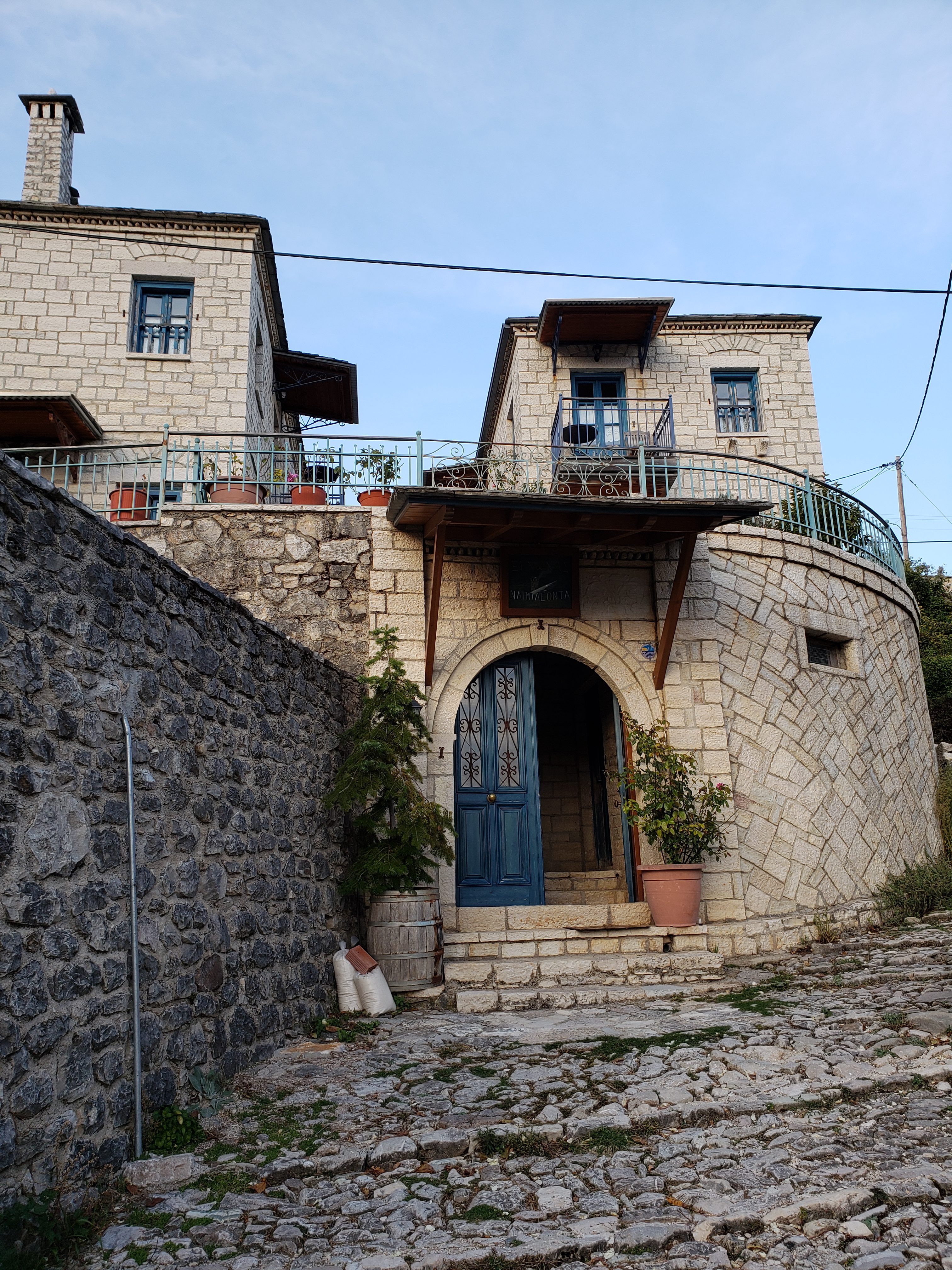
Later, stepping out for a stroll, I saw only a few people sitting outside at the two other cafes/restaurants in town. It was very quiet. I wandered around enjoying the views and silence.
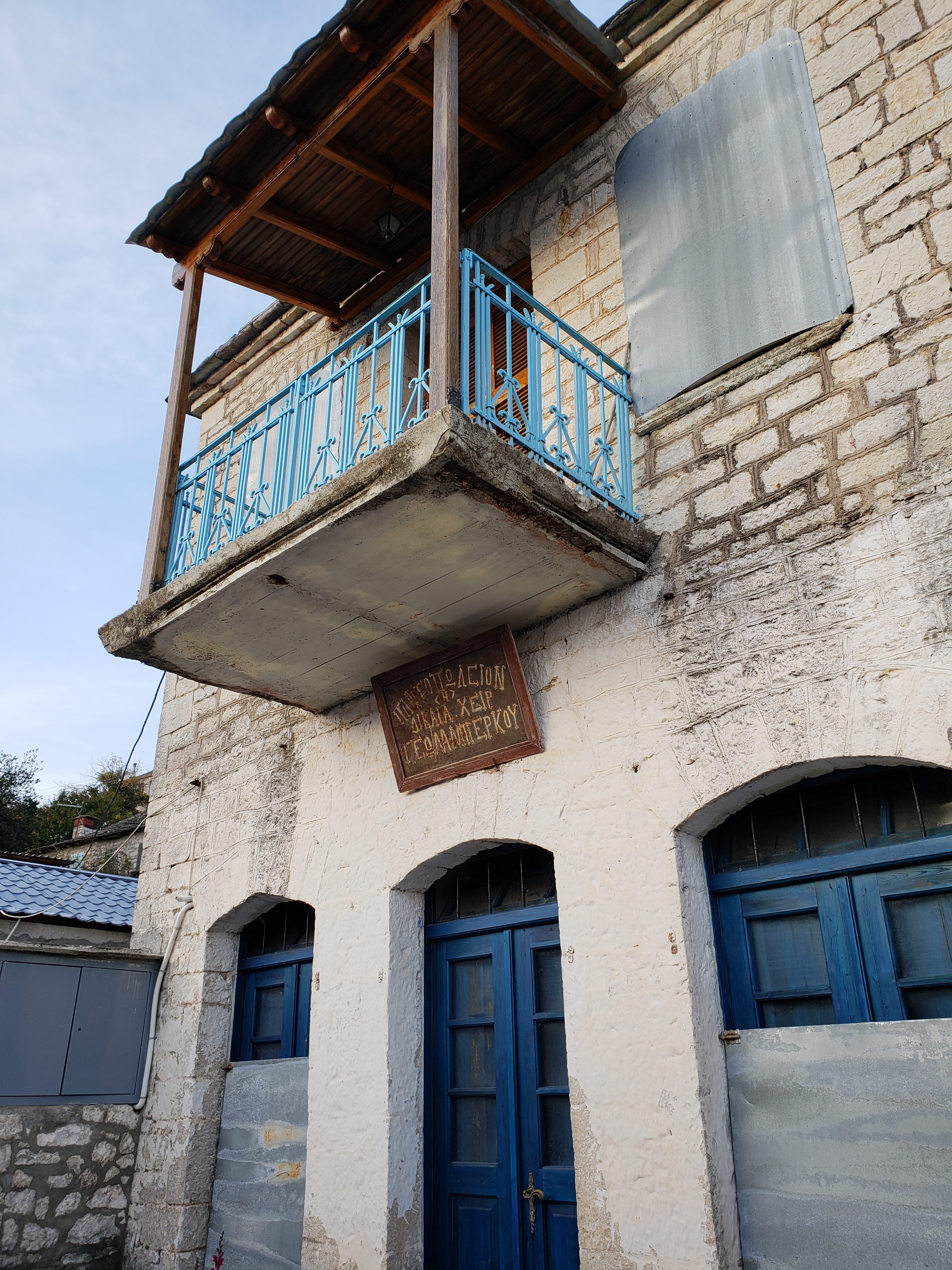
And then I heard a man’s singing and walked toward his voice. He was sitting on a tomb in the small cemetery. A woman and man were video-taping him. I stood nearby listening to his mournful melody.
I would get to meet the filmmakers later–in a village that size it would be impossible not to. Elpida, which means “hope” in Greek, and Nikos were there to shoot a documentary on a dying tradition. In the fall, sheep would be moved from their high summer pasture to a lower one for the winter. For centuries this migration had naturally been done on foot, but most shepherds today preferred to transport their sheep on trucks.
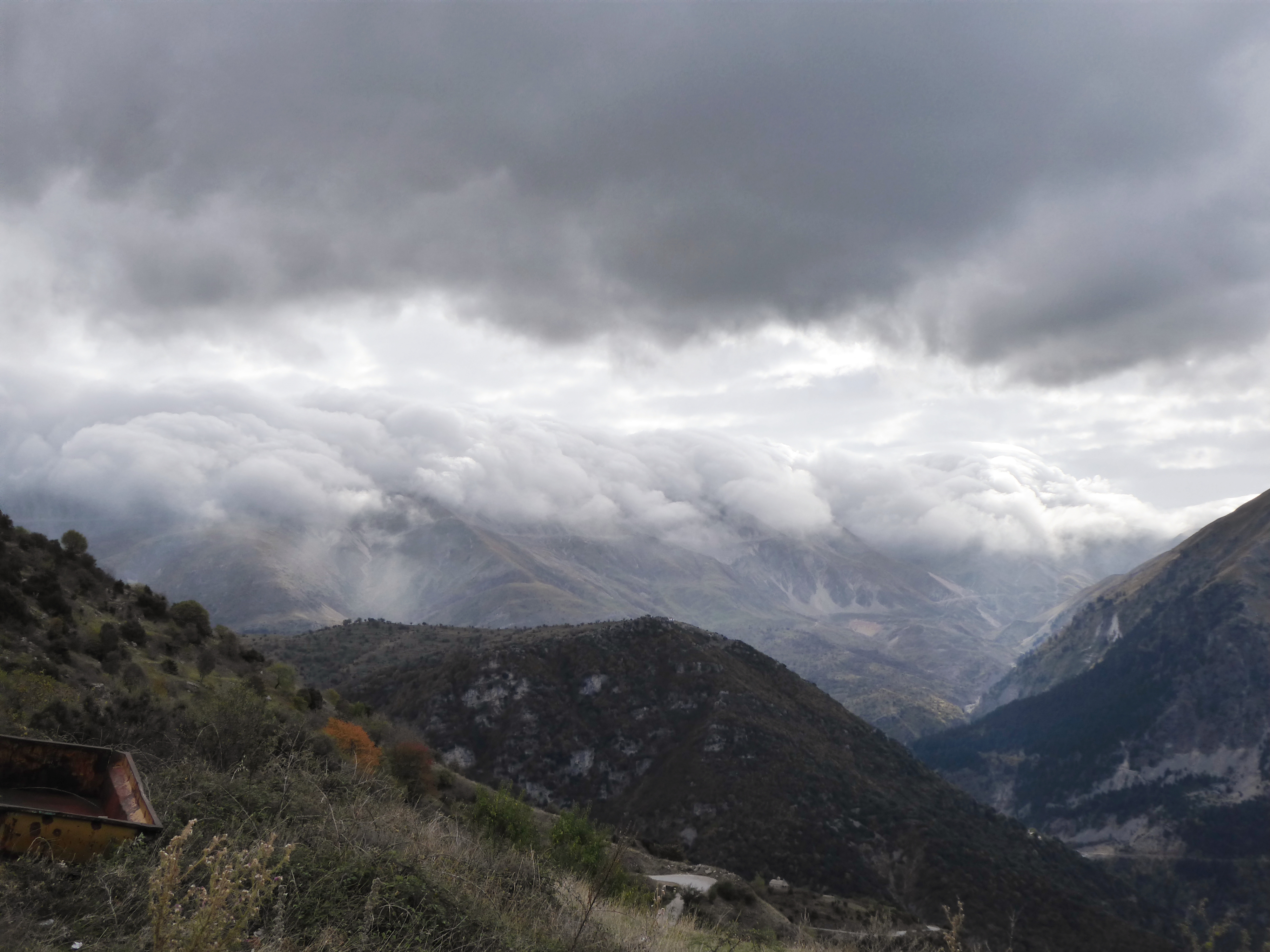
Petros, the man singing in the cemetery, and owner of six-hundred sheep, wished to retain the tradition, and respect the wishes of his father, who’d passed away at ninety-five the year before. His father thought it was unjust to relocate the sheep so quickly. “It would be like us arriving disoriented from an airplane trip.”
There would be some compromising. The original treks had been several days or longer. This more symbolic journey would be for one full day followed by the more expedient option the next. However, the arrival of the shepherds with the flock in the evening would be met with celebration, and no compromising. The migration was scheduled for the following morning.
I learned all this from Elpida, who spoke English perfectly. She’d worked in television for many years and was now making feature documentaries. Her long-time friend and soundman was Nikos.
The story captured my imagination. Elpida invited me to come along. The details were sketchy. She added, the celebration often ends quite late: there’s a lot of eating, dancing, music, and drinking. And she couldn’t guarantee she’d be available to take me back herself. But Napoleon would definitely be there and getting home shouldn’t be a problem. I took a glance over at Napoleon. He looked a bit like Santa Claus. I was thinking of those mountain roads at night, and tried to judge his affection for alcohol.
It was an experience too good to miss. I decided to take my chances.
I met Nikos and Elpida the following morning at breakfast. They were looking pleasantly chipper. They greeted me like an old friend. Labrini brought over copious amounts of bread, yogurt, jam, eggs, butter, and coffee.
Elpida ran off to take some morning shots of the area and Nikos and I lingered over breakfast with plans to all meet up again later.
By 10:30 we arrived at Petros “home.” It was a small camper that he and his family used while they grazed their sheep in the summer pasture. It was simple living–his pickup truck looked more luxurious. But the view was outstanding and there were no neighbors for miles around.

I’d hoped of walking with the shepherds and sheep, but because details remained vague, I decided it best to ride with Elpida and Nikos. We stopped often for filming and each time their equipment was lugged out of the car. I offered to help and was astounded by how heavy the camera and tripod was. Elpida carried it up and down the rocky terrain with ease.
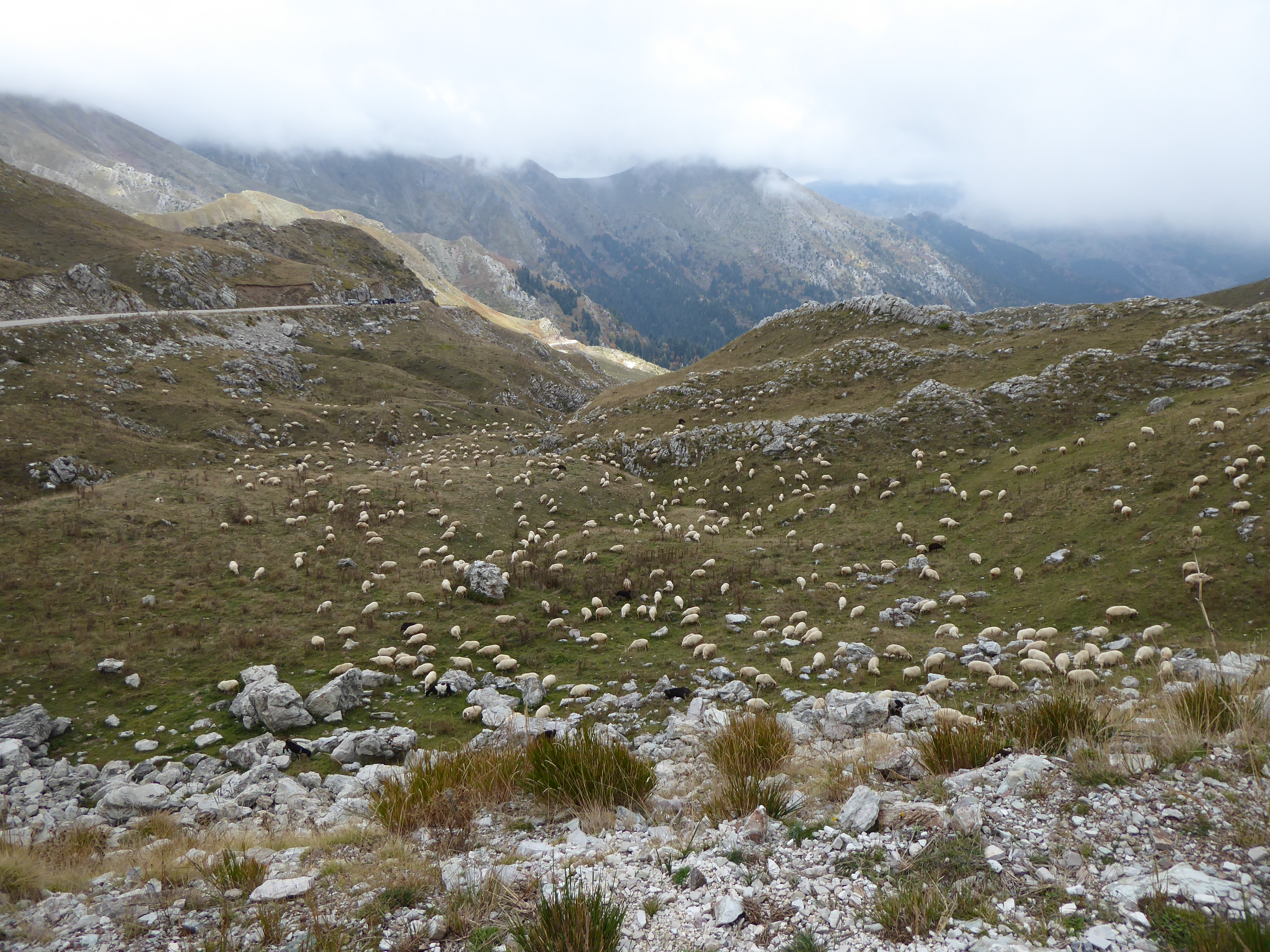
I enjoyed my time driving with Elpida and Nikos-they usually bantered in Greek, but watching the process of filming and the day unfold was never dull.
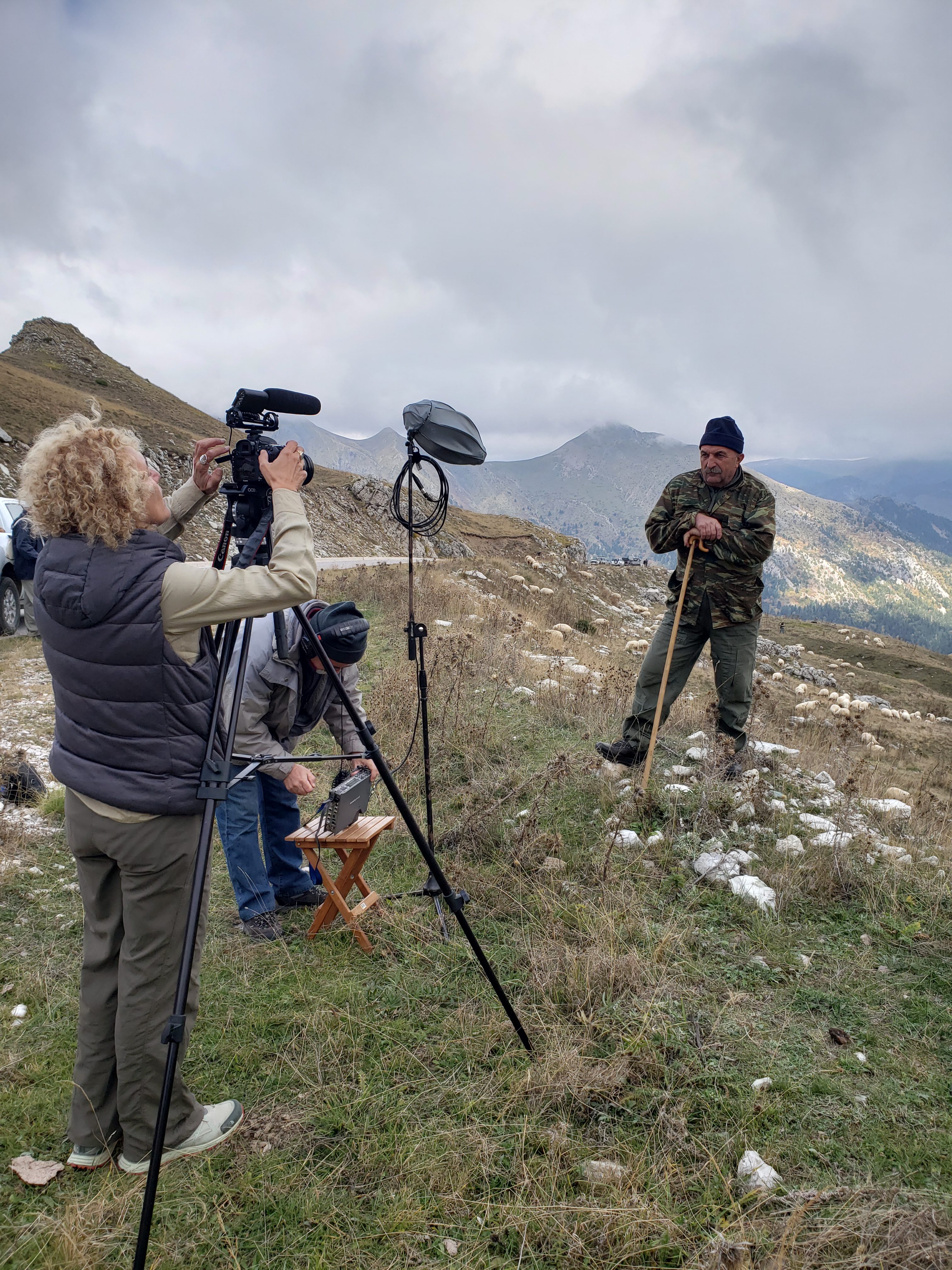
However I was itching to walk. A few hours later the shepherds stopped to take a break. I was able to gather that for the remaining time the shepherd would primarily be following the road. Any concerns about traipsing over mountain tops was dispelled.
When the shepherds continued, I went with them.

They didn’t seem bothered by my presence, but neither did they appear particularly interested. However they didn’t do much talking among themselves either. I don’t know if asking permission had been involved. I’d no indication it was warranted.
The air was cool and fresh. The views were splendid. And I thoroughly enjoyed walking amidst six-hundred sheep.
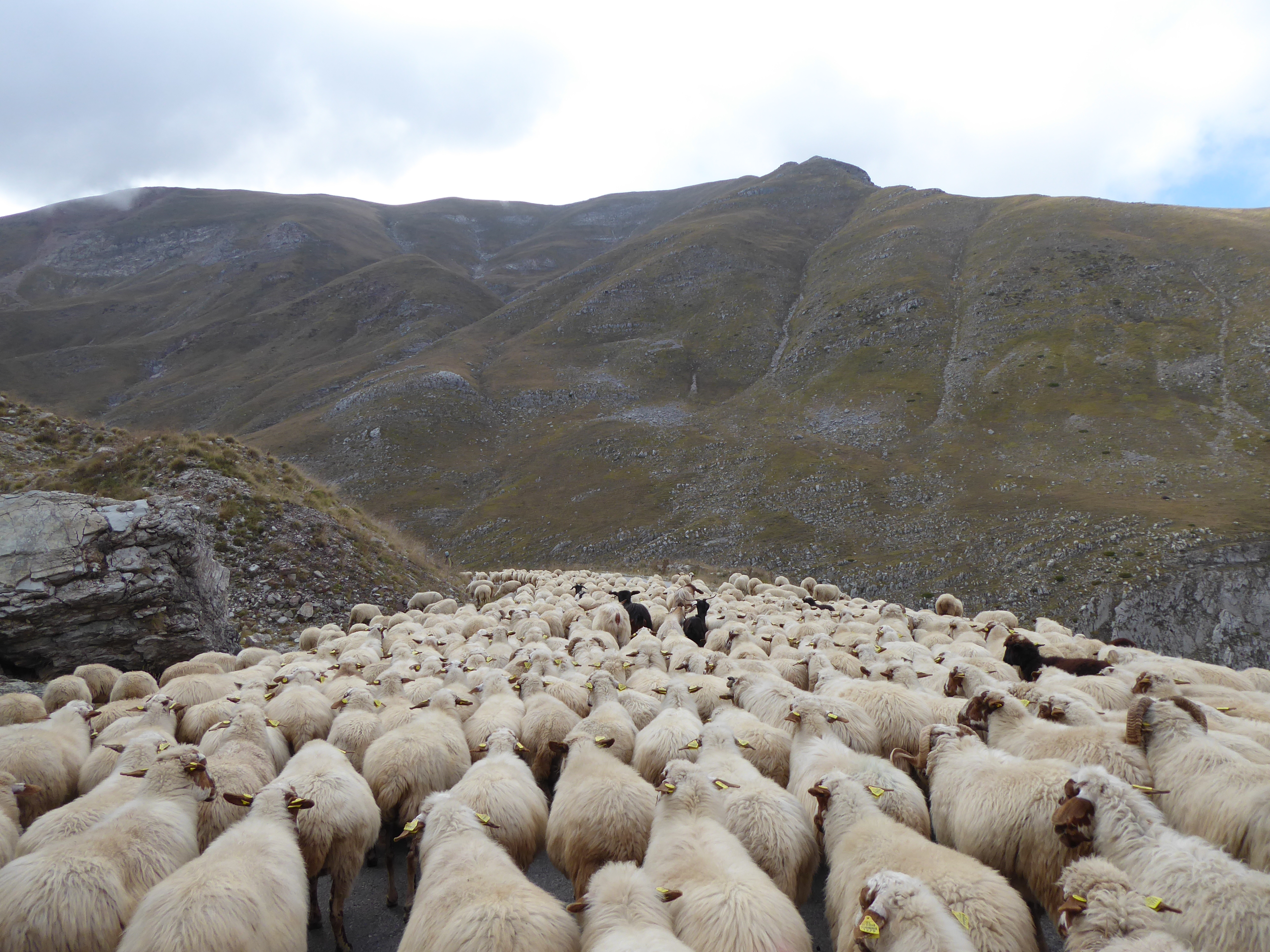
There were six shepherds. The youngest, about twenty, was the son of Petros. The others, except for another young man, were older–in their forties or fifties. They all walked upright and carried a wooden walking stick. But their pose at rest was always at a slant.
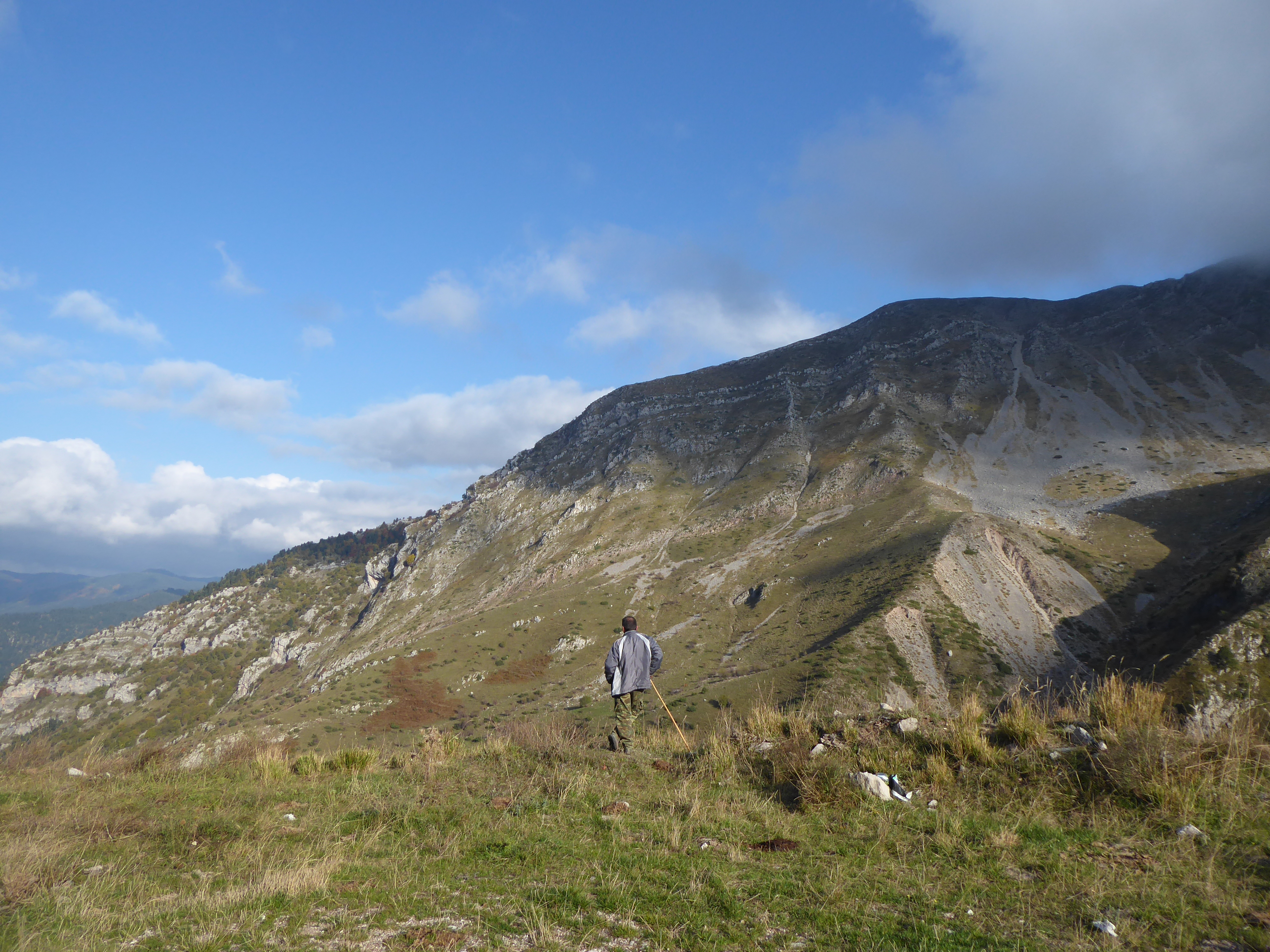
This ancient way of life may be in peril. The life of a shepherd is difficult and solitary. The young men today are opting for different lifestyles.
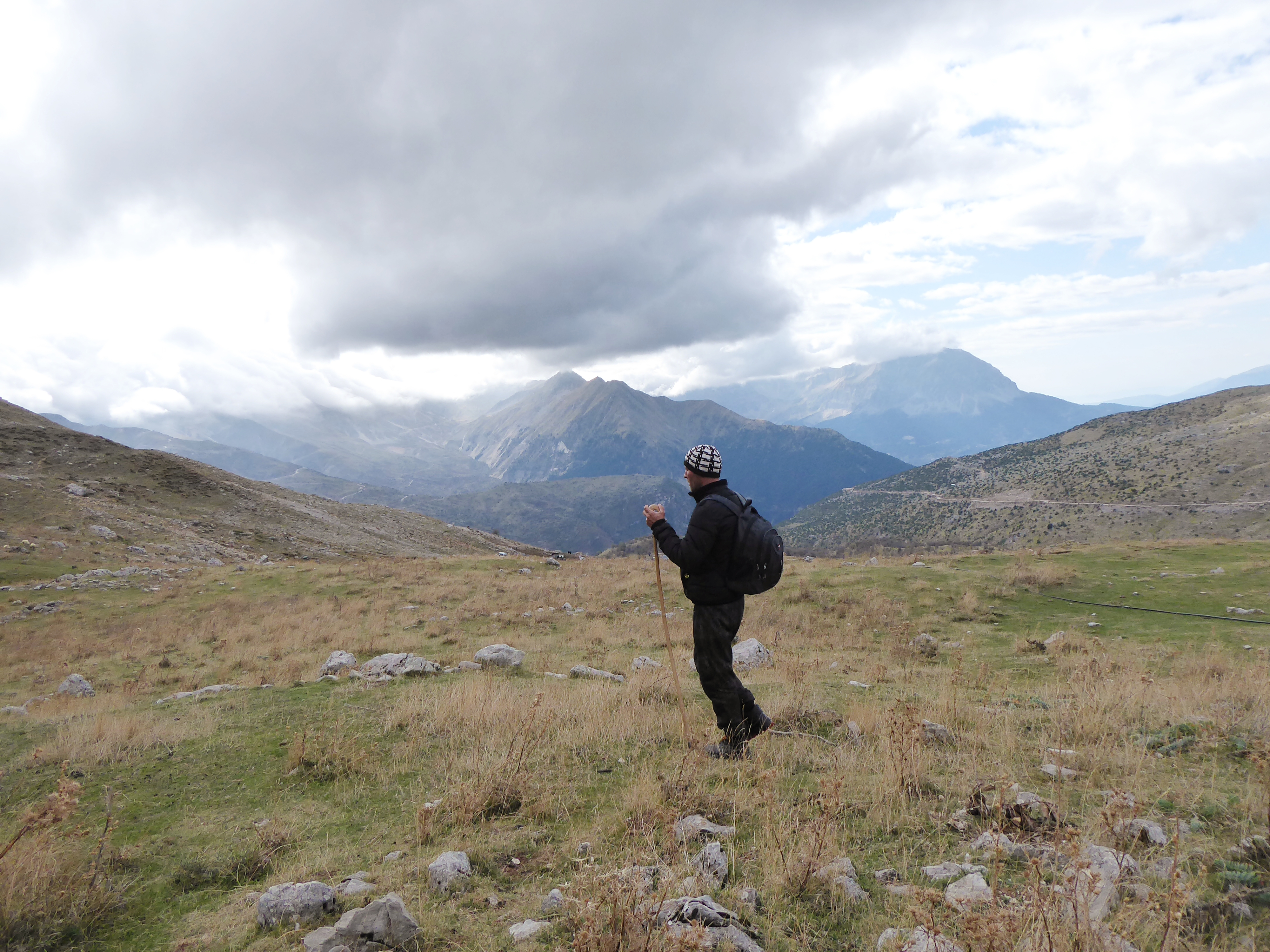
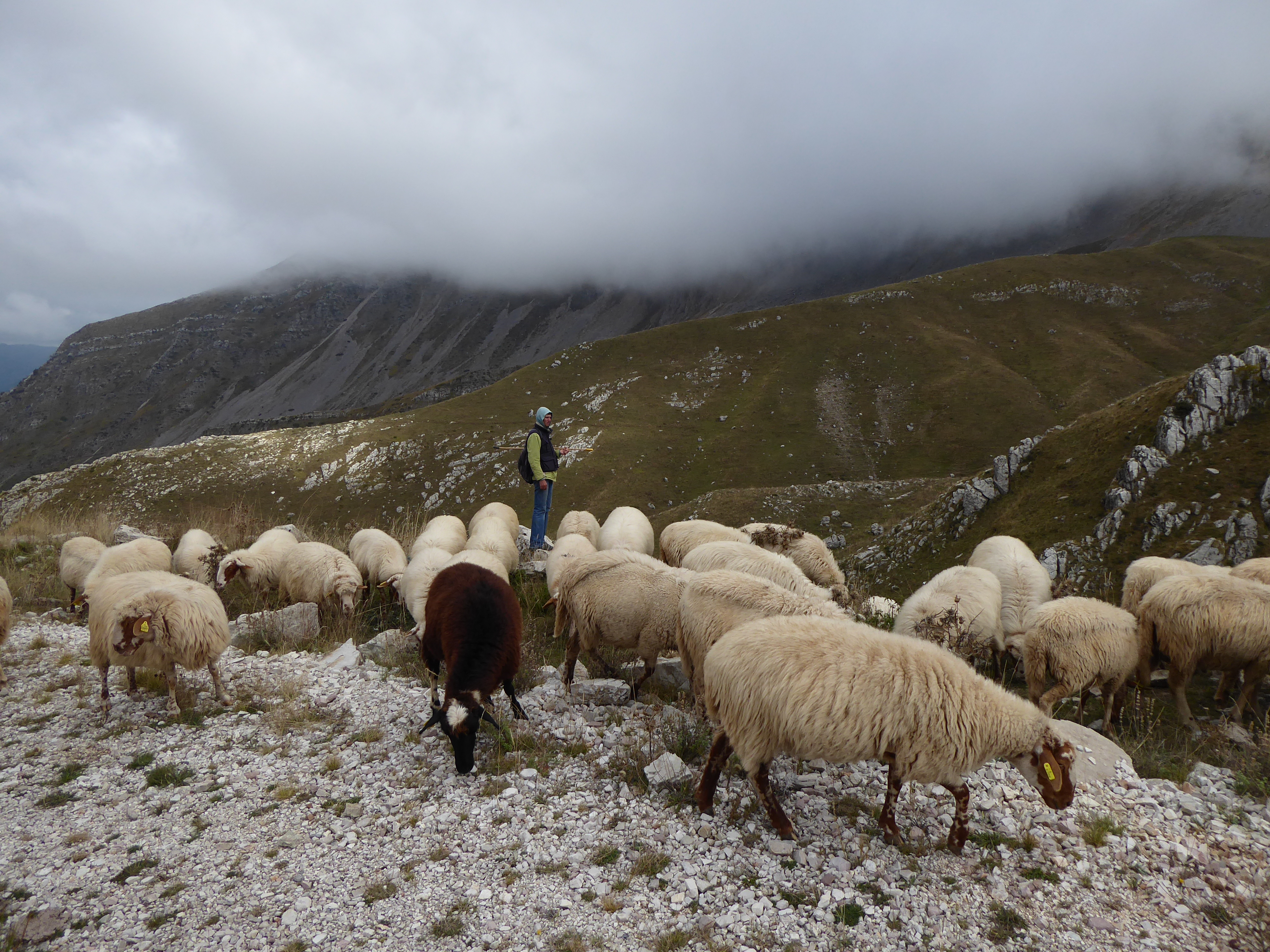
The sheep either followed each other or looked lost. I was not impressed with their intelligence, but they were always gentle. Certain metaphors seemed particularly apt. The few goats seemed to have much more on the ball, and looked frustrated when the herd stopped for no reason. Maybe I read too much into their expressions.
I did my share of keeping the sheep together. But my attempts at making the same calls and sounds the shepherds did to encourage movement of the flock–one was a loud BRRRRAAH–was generally unsuccessful. I kept trying. As time went on the men became friendlier.
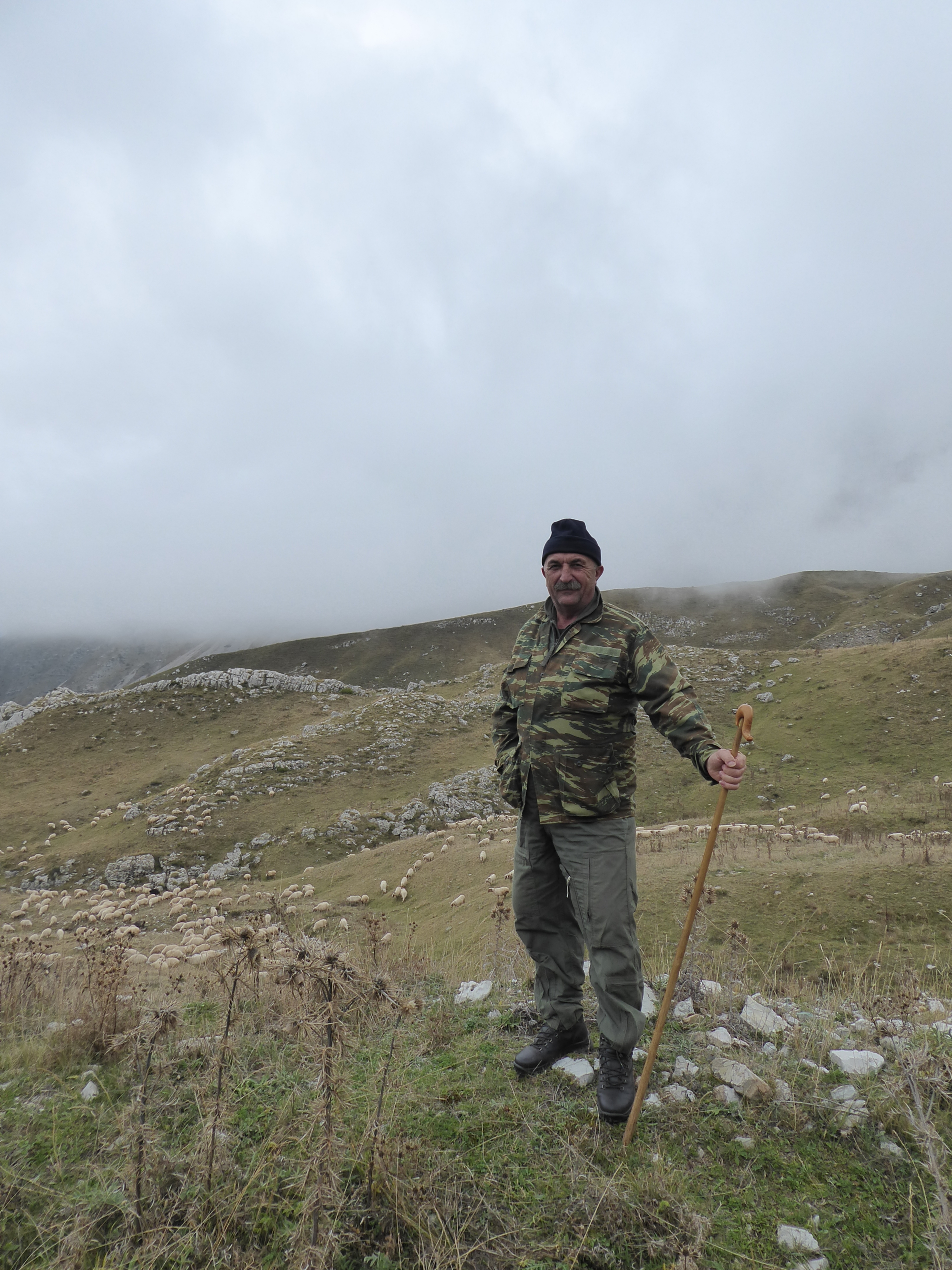
If the sheep did stray, the two sheepdogs did little about it. They just moseyed along. The men were spread out and that task was left to them. (I would learn later the dogs’ role was primarily to protect the sheep from predators.)
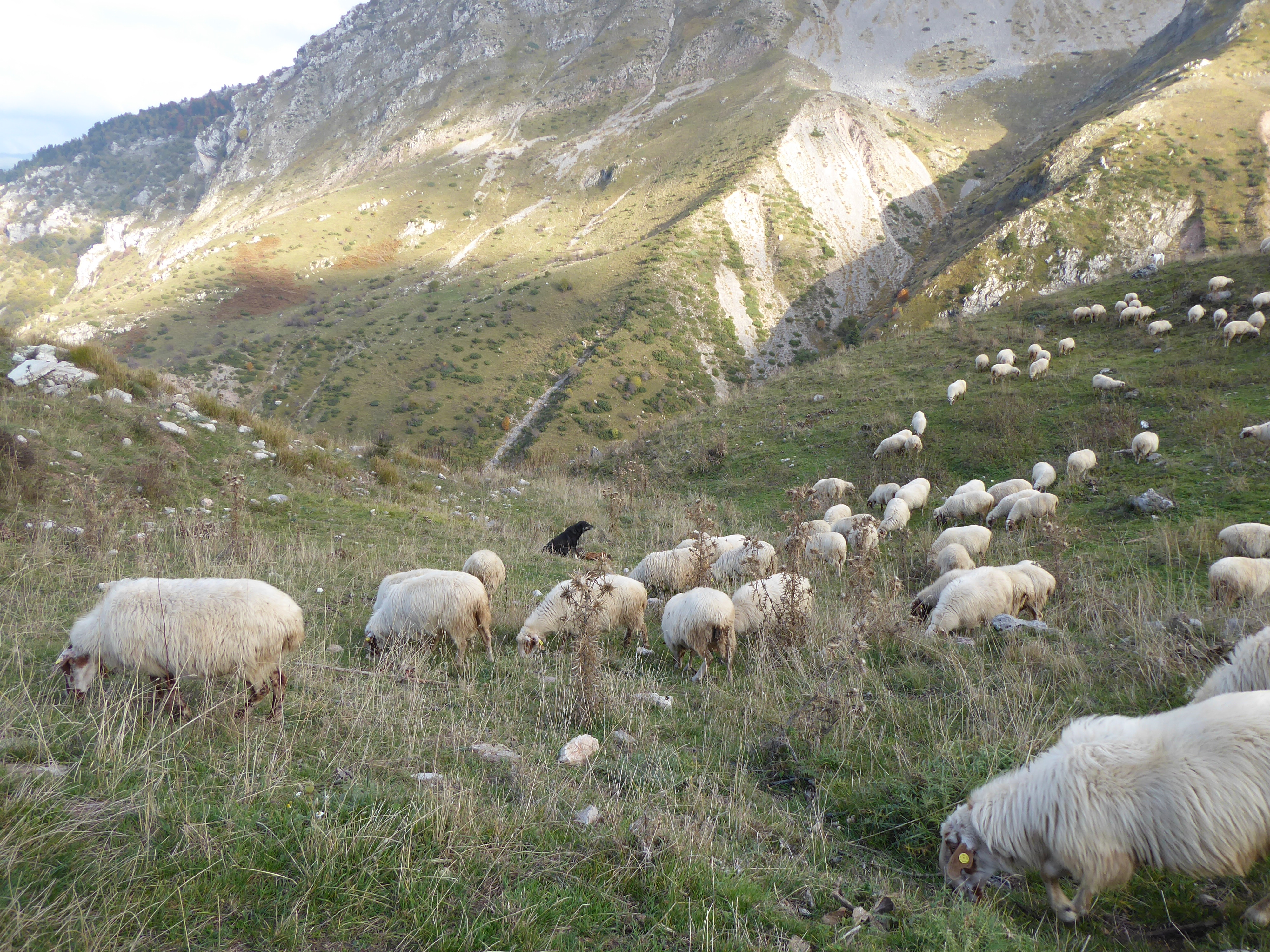
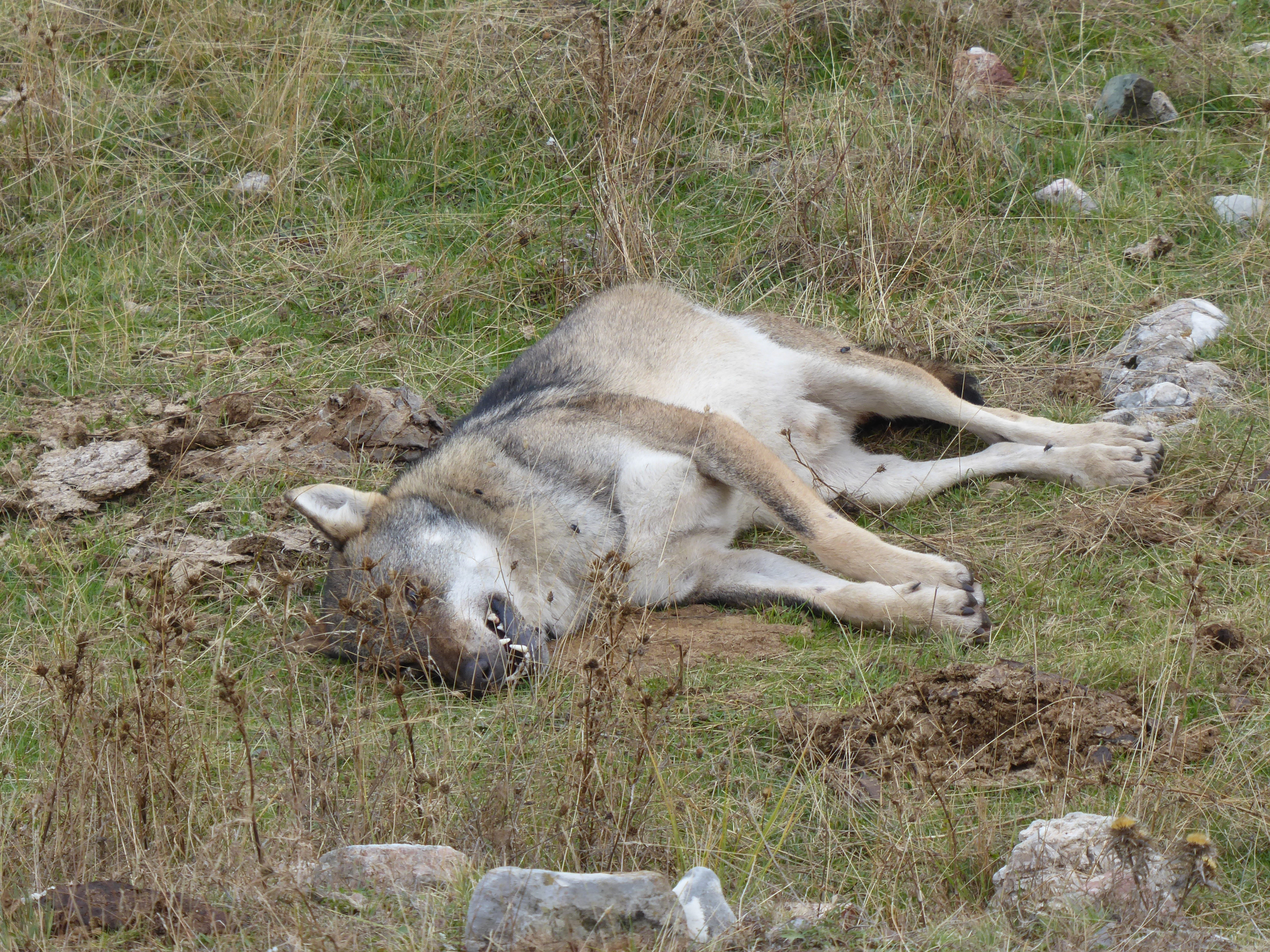
The flock would stop moving when they were not urged on. I’m not sure it was an honor, but I was asked to lead them. And so I walked ahead and the flock followed. The sheepdogs stayed nearby, perhaps sensing my inexperience, and not wishing to take any chances.
Near the end we made our way off the road, through the woods, across a pasture with a small herd of amiable cows, and down toward the pasture.
When we arrived a large bonfire was roaring and both men and women were serving food and drink. My hands were quickly filled with both.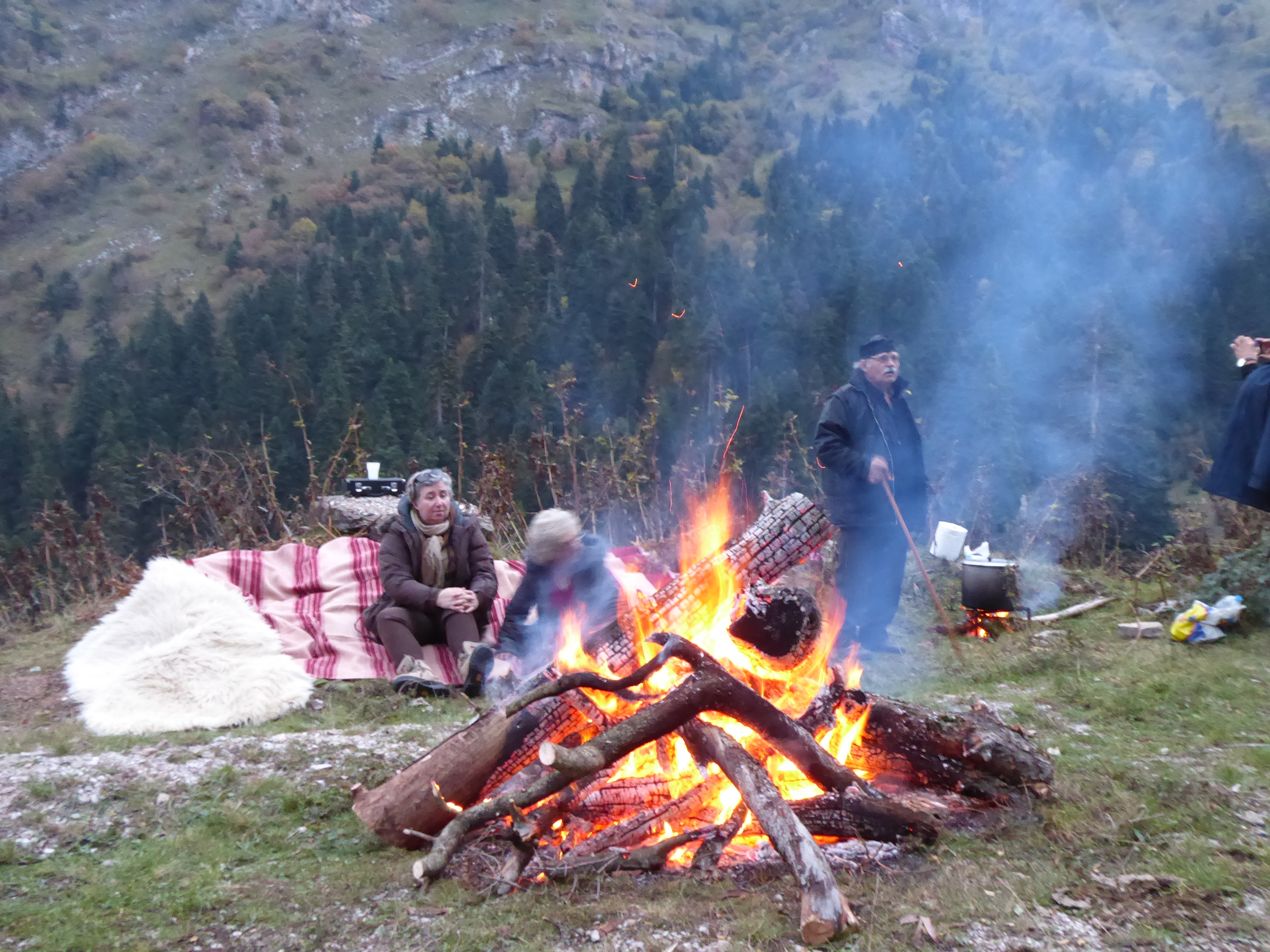
Elpida and Nikos never sat for a moment. They were too busy filming.
Soon the haunting vocals of Napoleon and Petro were accompanied with clarinets, fiddle, guitar, bouzouki, and hand drum. It reminded me of Klezmer music. Men began dancing by walking in a circle holding hands or with their arms around each other. The first two men would be holding a handkerchief held high between them. And the first man would take his solo, all the while holding the handkerchief for support. The movements were generally slow and steps were determined by the dexterity of the dancer. It was a moment for the more capable dancers to flaunt their abilities, but all efforts were welcome. A few women joined in too.
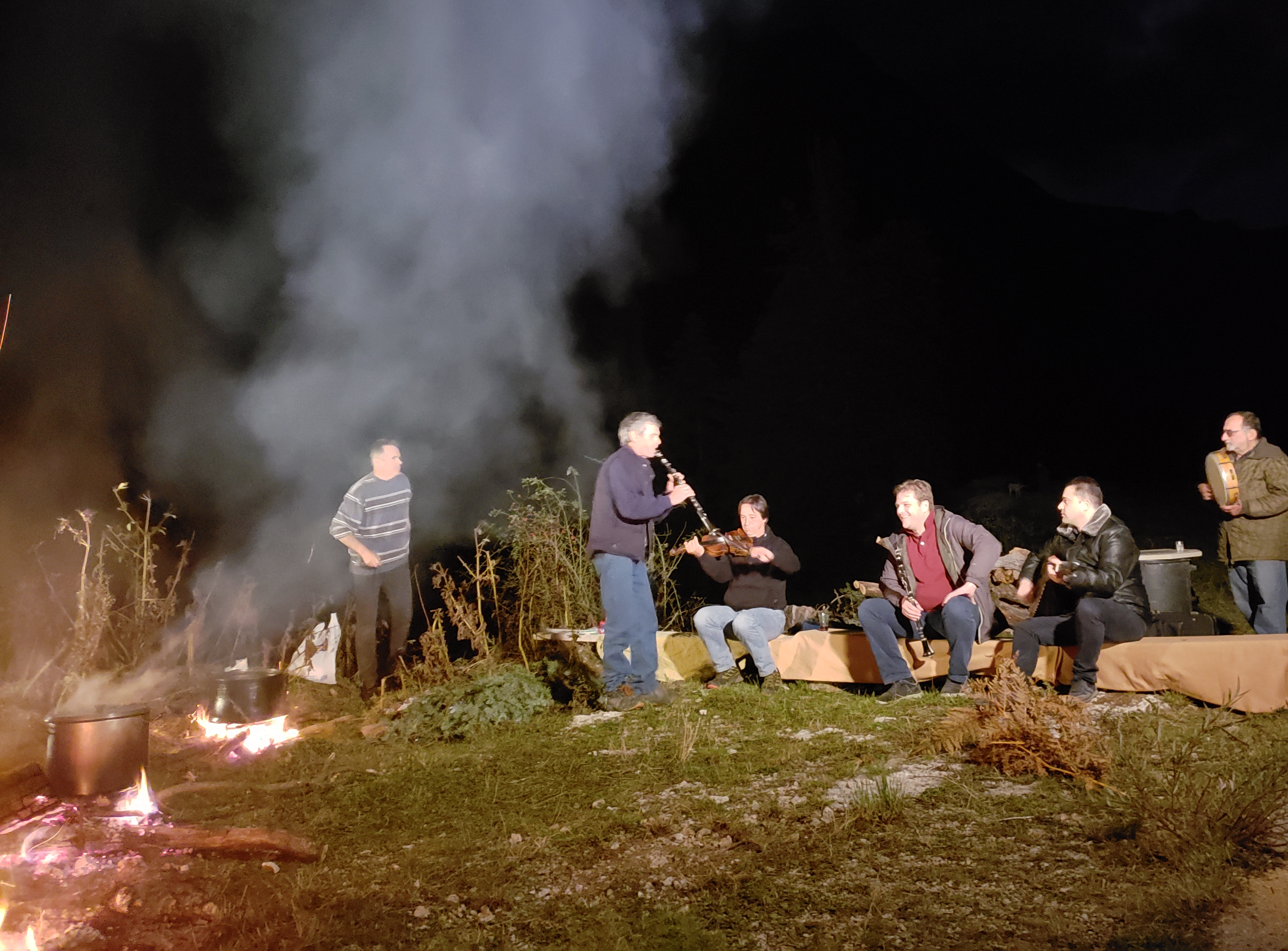
One of the shepherds sat next to me. I hadn’t seen much of him during the day and didn’t realise he spoke English. When the musicians sang, he softly translated the lyrics for me. Some of the songs were the lament of Greek emigrants missing home, others were traditional folk songs about love, and others were songs of these mountains.
Around midnight the chill, despite the bonfire, began seeping in. People began to leave. Tired from a full day, I was pleased when Nikos came to me and said Napoleon would be leaving soon. He and Elpida would stay on another hour or so to pack up.
I got into Napolean’s pick-up and we set off. He looked completely sober. His singing had been beautiful and I told him, then asked if he would sing again. I spent the next forty-minutes listening to his wonderful voice fill the silence as he drove, very slowly, on the dark mountain road.
I felt privileged to share time in his world.
When I went for breakfast the following morning Elpida and Nikos were already there. They were driving back to Athens that afternoon for another project. They seemed to have endless energy. We shared warm goodbyes and spoke of keeping in touch and we have.
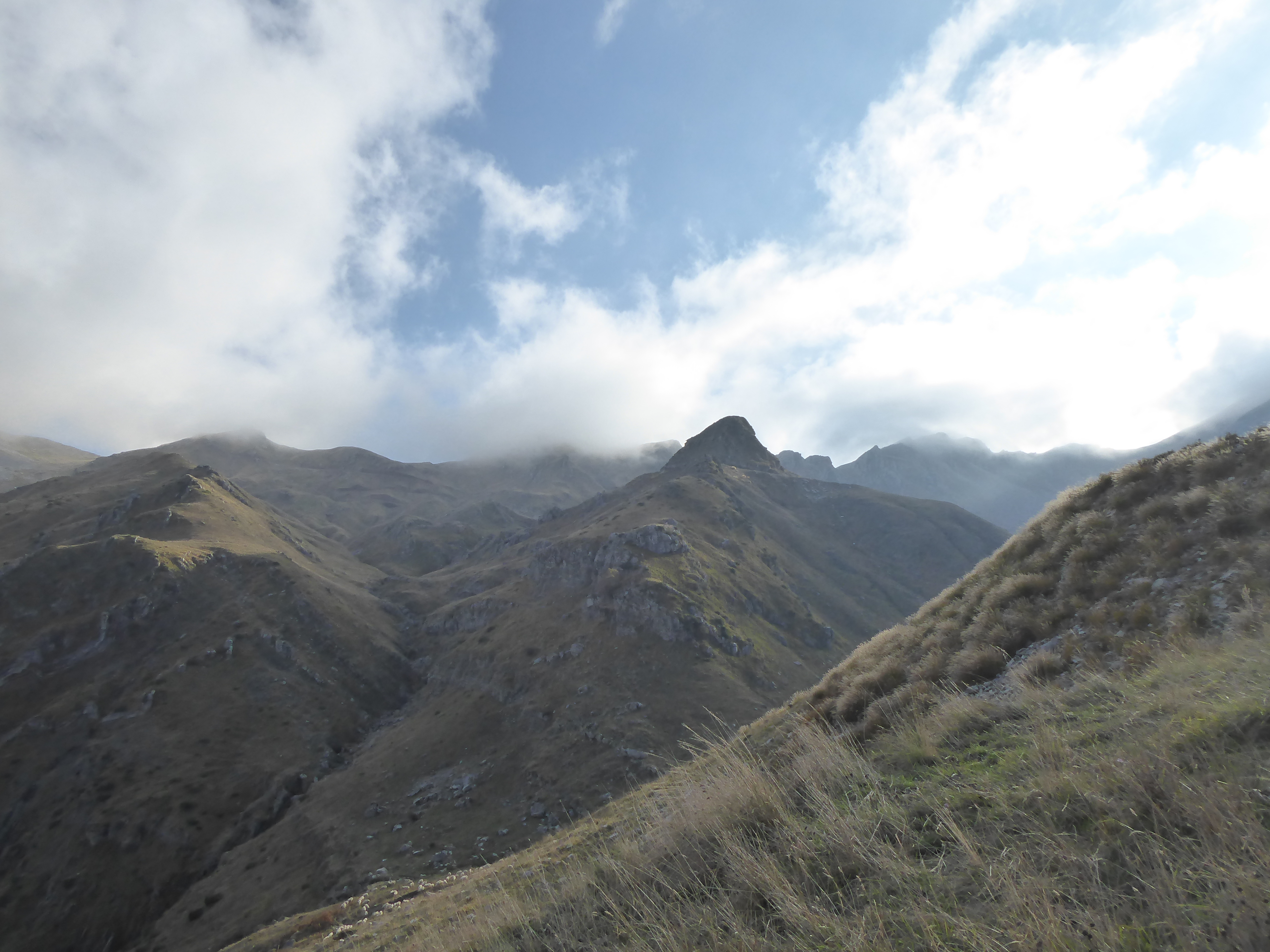
I spent that afternoon hiking to Sarroka, another petty hamlet in the area. The hike took me down to a river and up a long, steep bank. The views were lovely, and I had a nice lunch there before returning home, but my thoughts kept drifting back to the images, music, and experiences of the previous day.
